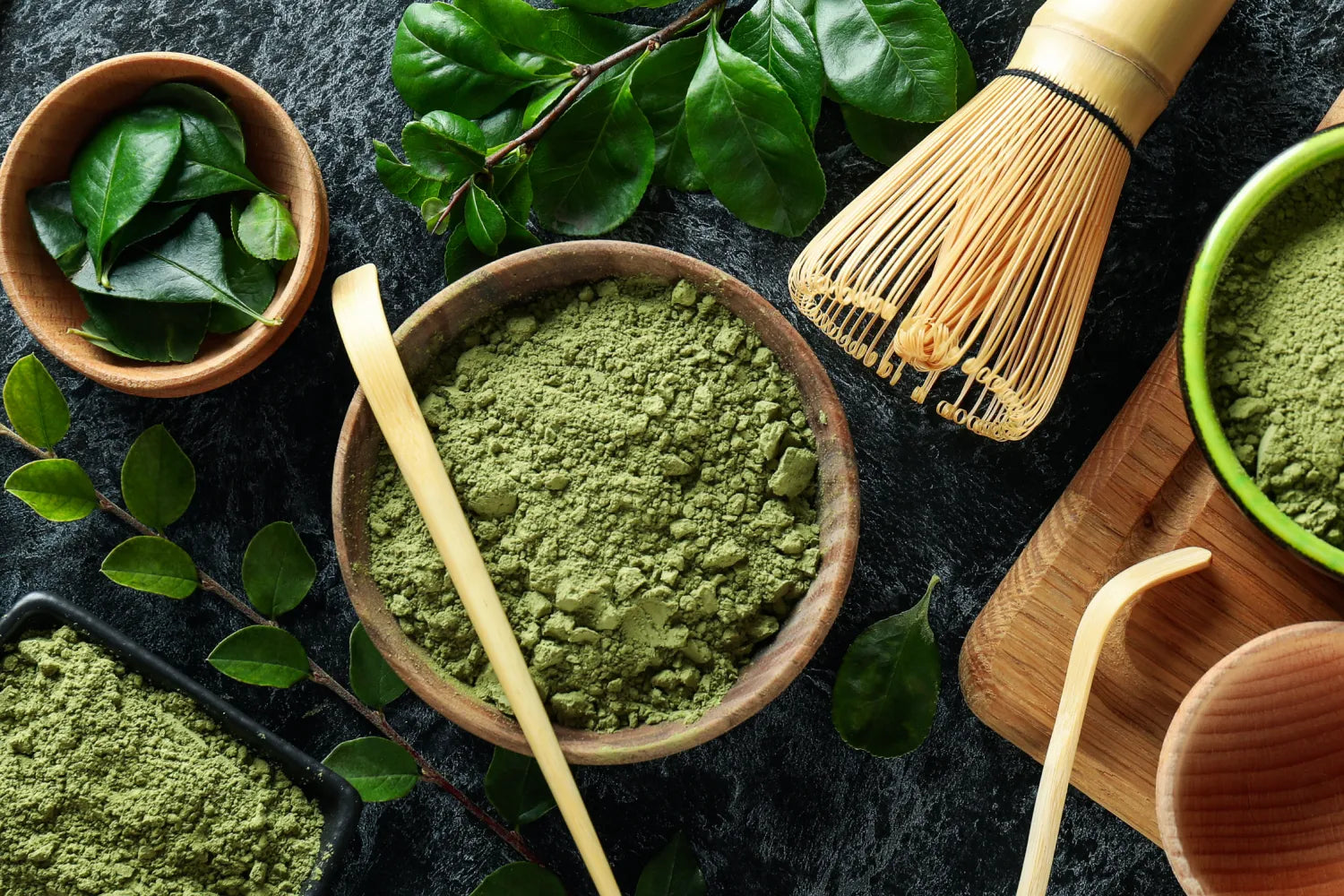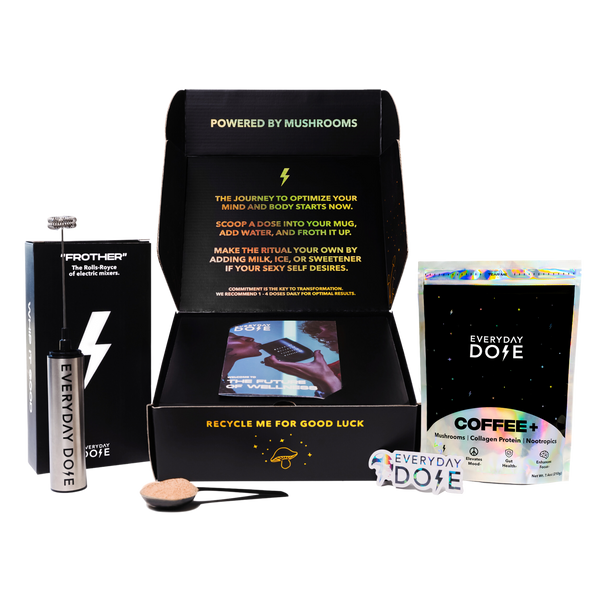Is Matcha Keto-Friendly?

If you’ve ever tried a diet like keto, paleo, or even vegan, then you probably know that the benefits can be amazing. However, as you likely already know, finding the motivation to follow the diet is the hard part. It’s all too easy to cheat a little bit here, and a little bit there — until suddenly, you’re totally off your diet.
This is even more true for a diet like keto, which depends on strict consistency and adherence to the diet. In order to keep yourself from fully going off the rails, it’s important to find ways to treat yourself that won’t compromise your diet.
One way you can treat yourself is by taking things you already enjoy and making them fit within the limits of your diet. For instance, if you love matcha, there are ways to make it that won’t throw you out of ketosis. Read on to learn more about matcha, the keto diet, and how to enjoy matcha on keto.
What Is Matcha?
With its vibrant green color and ancient origins, matcha is undoubtedly Instagram’s favorite drink. However, it’s more than just a pretty prop — matcha has powerful benefits that have been prized for thousands of years.
Matcha is made from the same plant as black, white, and green tea. Camellia sinensis, informally called the tea plant, grows natively in China and parts of Japan. However, this plant can grow anywhere in the world and is also very common in India.
What sets matcha apart from regular green tea is the way it's grown and processed. Plants that will be used to make matcha are grown almost entirely in the dark to increase their concentrations of caffeine and chlorophyll. Additionally, matcha is made only from the youngest leaves on the tea plants. This is what gives the tea its characteristic sweet, earthy taste.
Regular green tea is made by steeping green tea leaves in hot water and then removing the leaves, resulting in what is called an infusion. In contrast, matcha is made by mixing powdered green tea leaves with water and drinking the whole concoction. Many of the powerful benefits of matcha exist because you’re actually ingesting the leaves themselves.
What Is the Keto Diet?
The ketogenic diet was developed by Dr. Russell Wilder of Mayo Clinic in 1921. Originally, this diet was used to treat epilepsy — however, it eventually became popular because of its potential for those struggling to maintain healthy blood sugars.
The keto diet works by limiting carb intake and increasing fat intake. The end goal is to enter a state of ketosis, where your body burns fat instead of carbs for energy. This can help your body burn off its extra stores of fat, which also makes keto a popular diet for those looking to lose a little weight.
There are many variations of the keto diet, but the standard keto diet involves eating at a ratio of around 70 percent fat, 20 percent protein, and only 10 percent carbs. This is obviously an extremely low-carb diet, so it’s important to always work closely with a doctor, nutritionist, or registered dietitian while you’re on keto to make sure your body gets the fuel it needs to thrive.
Is Matcha Keto-Friendly?
The short answer is yes, matcha is keto-friendly. Don’t just take our word for it, though — let’s see what the experts say.
According to the USDA, two teaspoons of matcha powder contain only three grams of carbs. Since fiber takes up one of those grams, the same amount of matcha has about 2 net carbs.
That said, the actual carb count of the matcha in your cup might be different. For instance, our Mushroom Matcha+ powder contains only one gram of carbs per serving. If you’re counting your carbs, make sure you read the label of whatever matcha powder you use for the most accurate measurements.
While matcha itself is pretty low-carb, there may be sneaky carbs hidden in the way you prepare it. If you make matcha the traditional way by simply combining the powder with hot water, then you won’t add any carbs and your drink will still be keto-friendly.
However, if you’re used to making matcha lattes or smoothies, then you may want to double-check the ingredients you’re using. Dairy milk tends to be high in carbs and might throw you out of ketosis, so you may want to swap that out for almond milk. Other smoothie ingredients, like fruit, protein powder, and even nut butters can also be unexpectedly high in carbs.
How Can Mushroom Matcha Support the Keto Diet?
Matcha is a great treat you can enjoy while you follow a keto diet, but it can also support the benefits of the diet. Drinking matcha might not just be a way to stay sane when the cravings hit — it can actually help you see the diet’s results. This is especially true for mushroom matcha blends like our Mushroom Matcha+.
Here are some mushroom matcha benefits that can support the keto diet:
- Supports a Healthy Metabolism: Matcha can support healthy blood sugar levels, which can compound with similar benefits offered by the keto diet.
- Encourages Gut Health: Our mushroom blend contains both matcha and lion’s mane mushrooms, which are both great sources of prebiotic fiber. This can support a balanced gut microbiome, which can support nutrient absorption while you’re on your diet.
- Supports Energy and Focus: Finally, matcha contains L-theanine, an amino acid that can help you feel relaxed and focused. This is especially helpful for combatting feelings of fogginess and tension as your body adjusts to keto. Our blend also features lion’s mane, which has similar benefits for brain health.
The Bottom Line
Matcha is a powdered form of green tea that is gloriously low-carb, which means you can enjoy it even when you’re following a keto diet. However, make sure any ingredients you add to your matcha, such as flavored syrups, milk, and smoothie ingredients, are also low-carb.
Drinking matcha isn’t just allowed in the keto diet — it may actually support your results by encouraging healthy blood sugar levels, supporting gut health, and encouraging energy and focus. Plus, our mushroom matcha blend also includes lion’s mane mushroom, extra L-theanine, and collagen protein to support gut and brain health.
To learn more about our ingredients and why we chose them, visit the Everyday Dose blog today.
Sources:
Ketogenic Diet - StatPearls | NCBI Bookshelf
What is Ketosis? | Charlie Foundation
[historical record]: matcha green tea powder, matcha green tea | USDA








